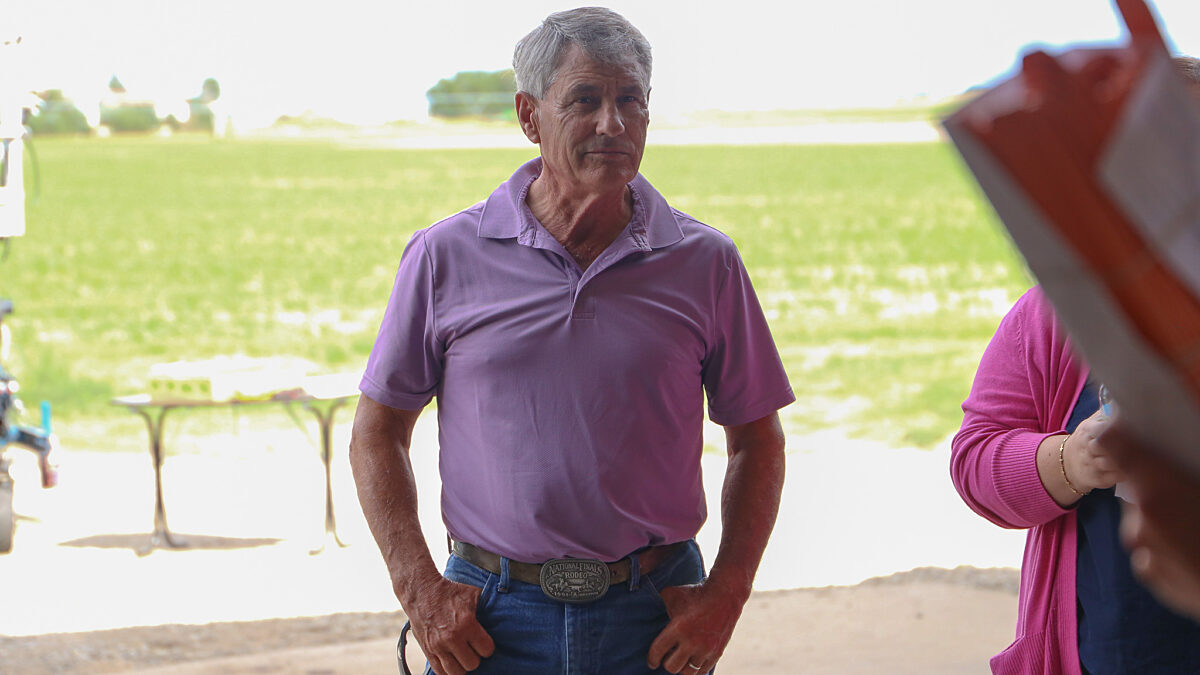What is Regenerative Agriculture?
Cyndie Shearing
Director, Communications

photo credit: Kansas Farm Bureau, Used with Permission
Cyndie Shearing
Director, Communications
This is the first in a series of columns featuring conversations with state Farm Bureau presidents about current issues in agriculture. Joe Newland is president of Kansas Farm Bureau. He and his wife, Dana, farm 4,000 acres of wheat, corn, soybeans and hay, in addition to managing a 450-head cow-calf beef cattle herd.
Q. How would you define the term regenerative agriculture? Do you practice this on your farm?
A. Joe Newland:
I think regenerative agriculture is a new term for the things farmers and ranchers have been doing for a long time to create healthy, thriving soil. It’s been our mindset to make the land better for the next generation, and we’ve always been mindful of that. There are a lot of factors that go into building soil and in our area we’ve been able to enhance the ecology of our soil through crop rotation, using chicken litter as a fertilizer and employing technology to allow us to use fewer pesticides.
Q. What technologies and innovative practices do you use on your farm to protect natural resources and promote soil health?
A. Joe Newland:
We want to build soil in the right way, and that starts with grid sampling where we select soil from multiple locations across a field to build a profile of what’s happening in the soil. This allows us to apply fertilizer at a variable rather than uniform rate across the field and reduce the total amount we apply. Everything we do relies on the soil, and the healthier it is, the stronger our crops are. We have invested heavily in natural buffers, grass waterways and terraces to enhance water quality and preserve our soil.
Everything starts with farmers and ranchers, and healthy meals start with healthy farms.
Q. Farmers rely on a number of tools, including pesticides, to protect crops and keep the soil healthy. If these tools are no longer available, how might that affect food security and sustainability?
A. Joe Newland:
Pesticides and herbicides, when used responsibly, are effective tools for increasing crop yields while preserving and enhancing our soil. Modern technology allows us to make precise, timely applications to protect our crops. These chemicals allow us to leave the soil mostly undisturbed, which prevents soil erosion and saves on labor and fuel costs. Not tilling the fields also leaves behind crop residue that provides food and cover for wildlife. Without access to these critical crop protection measures, we would produce less food or need more land to grow the same amount.
Q. How does your commitment to the health and safety of your family and neighbors impact the choices you make on your farm?
A. Joe Newland:
We always want to make sure we’re doing things the correct way and safety is at the forefront of everything we do. The health and wellbeing of my family, our workers and our neighbors is top of mind for everything we do on the farm because it’s not just where we work, it’s where we live. I cannot imagine doing anything to put those closest to me at risk. Farming and ranching is a family business and we’re always working to do our best today so future generations can follow in our footsteps.
Q. What does animal care look like on your farm, and how do you work with veterinarians to ensure your animals are safe and healthy?
A. Joe Newland:
Just like creating a long-term relationship with a primary care doctor is important for our health, our 45-year relationship with our veterinary company is key to ensuring the health and safety of our livestock, not only for the animals but those of us working with them as well. Healthy, well-cared for animals are always the safest to work with. Whenever we have an issue come up, we know we can call our veterinarian and our cattle will receive the care they need to ensure they are healthy.
Q. As policy discussions continue about improving Americans’ health, what role do you see for farmers?
A. Joe Newland:
Everything starts with farmers and ranchers, and healthy meals start with healthy farms. We eat the same things as everybody else, and we don’t want to grow anything that’s not safe for our family to enjoy at the dinner table. There’s a lot of pride in our work because we raise a diverse range of safe, affordable food for our friends, family and the world. We’re always looking for ways to do better to ensure we can continue to offer an abundance of choices to meet the nutritional needs of the nation and world.
